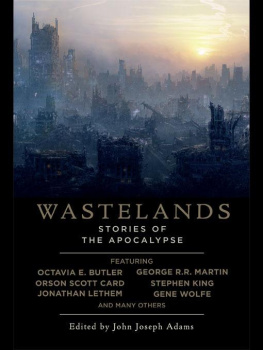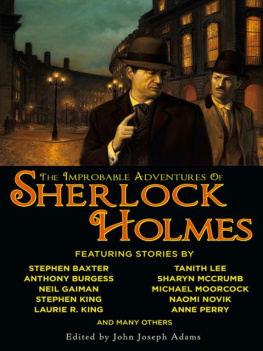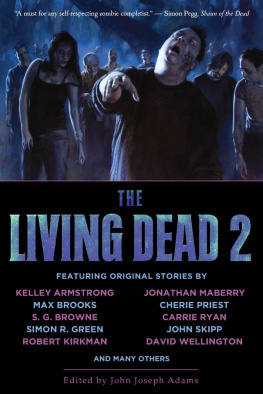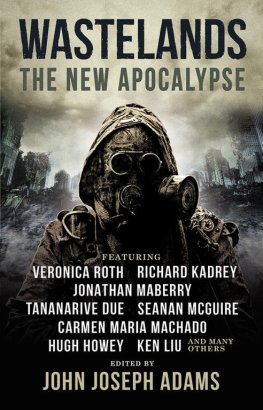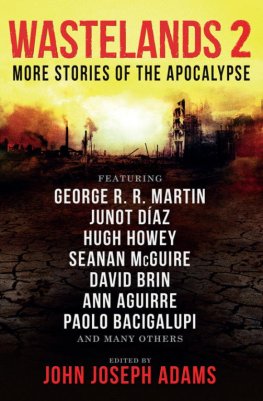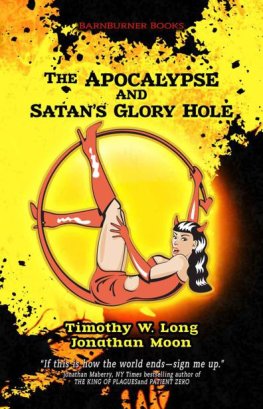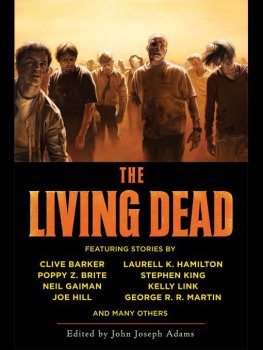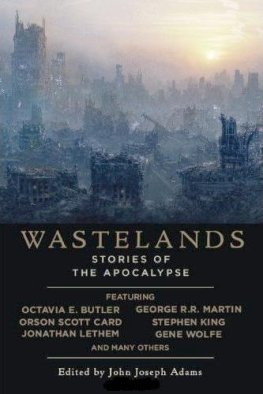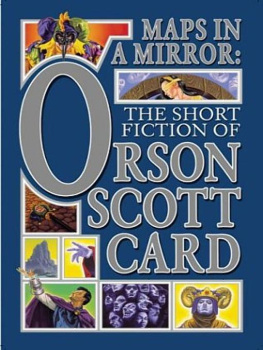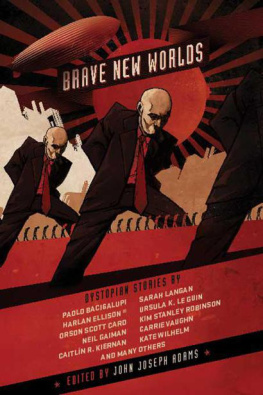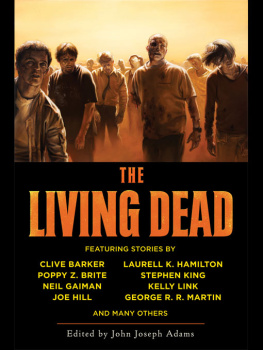WASTELANDS
Stories of the Apocalypse
edited by John Joseph Adams
Wastelands (c) 2008 by John Joseph Adams
This edition of Wastelands (c) 2008 by Night Shade Books
Jacket art (c) 2008 by Daniel Kvasznicza
Jacket design by Michael Fusco
Interior layout and design by Jeremy Lassen
All rights reserved
Introduction, For Further Reading and author notes (c) 2008 by John Joseph Adams
Printed in Canada
First Edition
ISBN 10: 1-59780-105-4
ISBN 13: 978-1-59780-105-8
Night Shade Books
Please visit us on the web at
http://www.nightshadebooks.com
Acknowledgments
The End of the Whole Mess (c) 1986 by Stephen King. Originally published in Omni, October 1986. Reprinted by permission of the author.
Salvage (c) 1986 by Orson Scott Card. Originally published in Isaac Asimovs Science Fiction Magazine, February 1986. Reprinted by permission of the author.
The People of Sand and Slag (c) 2004 by Paolo Bacigalupi. Originally published in The Magazine of Fantasy & Science Fiction, February 2004. Reprinted by permission of the author.
Bread and Bombs (c) 2003 by M. Rickert. Originally published in The Magazine of Fantasy & Science Fiction, April 2003. Reprinted by permission of the author.
How We Got In Town and Out Again (c) 1996 by Jonathan Lethem. Originally published in Asimovs Science Fiction, September 1996. Reprinted by permission of the author.
Dark, Dark Were the Tunnels (c) 1973 by George R. R. Martin. Originally published in Vertex, December 1973. Reprinted by permission of the author.
Waiting for the Zephyr (c) 2002 by Tobias S. Buckell. Originally published in Land/Space, 2002. Reprinted by permission of the author.
Never Despair by Jack McDevitt (c) 1997 by Cryptic, Inc. Originally published in Asimovs Science Fiction, April 1997. Reprinted by permission of the author.
When Sysadmins Ruled the Earth (c) 2006 by Cory Doctorow. Originally published in Jim Baens Universe, August 2006. Reprinted by permission of the author.
The Last of the O-Forms (c) 2002 by James Van Pelt. Originally published in Asimovs Science Fiction, September 2002. Reprinted by permission of the author.
Still Life with Apocalypse (c) 2002 by Richard Kadrey. Originally published in The Infinite Matrix, May 29, 2002. Reprinted by permission of the author.
Arties Angels (c) 2001 by Catherine Wells Dimenstein. Originally published in Realms of Fantasy, December 2001. Reprinted by permission of the author.
Judgment Passed (c) 2008 by Jerry Oltion. Appears for the first time in this volume.
Mute (c) 2002 by Gene Wolfe. Originally published in 2002 World Horror Convention Program Book. Reprinted by permission of the author and the authors agents, the Virginia Kidd Agency.
Inertia (c) 1990 by Nancy Kress. Originally published in Analog Science Fiction & Fact, January 1990. Reprinted by permission of the author.
And the Deep Blue Sea (c) 2005 by Elizabeth Bear. Originally published in SCI FICTION, May 4, 2005. Reprinted by permission of the author.
Speech Sounds (c) 1983 by Octavia E. Butler. Originally published in Asimovs Science Fiction, Mid-December 1983. Reprinted by permission of the estate of Octavia E. Butler.
Killers (c) 2006 by Carol Emshwiller. Originally published in The Magazine of Fantasy & Science Fiction, October/November 2006. Reprinted by permission of the author.
Ginny Sweethips Flying Circus (c)1988 by Neal Barrett, Jr. Originally published in Asimovs Science Fiction, February 1988. Reprinted by permission of the author.
The End of the World as We Know It (c) 2004 by Dale Bailey. Originally published in The Magazine of Fantasy & Science Fiction, October/November 2004. Reprinted by permission of the author.
A Song Before Sunset (c) 1976 by David Rowland Grigg. Originally published in Beyond Tomorrow, 1976. Reprinted by permission of the author.
Episode Seven: Last Stand Against the Pack in the Kingdom of the Purple Flowers (c) 2007 John Langan. Originally published in The Magazine of Fantasy & Science Fiction, September 2007. Reprinted by permission of the author.
Introduction
by John Joseph Adams
Famine. Death. War. Pestilence. These are said to be the harbingers of the biblical apocalypseArmageddon, The End of The World. In science fiction, the end of the world is usually triggered by more specific means: nuclear warfare, biological disaster (or warfare), ecological/geological disaster, or cosmological disaster. But in the wake of any great cataclysm, there are survivorsand post-apocalyptic science fiction speculates what life would be like for them.
The first significant post-apocalyptic work is The Last Man (1826), by the mother of science fiction Frankenstein author Mary Shelleyso the sub-genre is in essence as old as science fiction itself. Although its origins are firmly rooted in science fiction, post-apocalyptic fiction has always been able to escape traditional genre boundaries. Several classic novels of the genre, such as Alas, Babylon by Pat Frank, On the Beach by Nevil Shute, and Earth Abides by George R. Stewart, were published as mainstream novels. That trend is seeing a resurgence, with authors like Cormac McCarthy venturing into post-apocalyptic territory with his bleak new novel The Road which was not only a best-selling book and an Oprah Book Club pick, but a winner of the Pulitzer Prize as well.
But SF has produced its share of novel-length classics as well, including the undisputed king of the sub-genre, Walter Millers A Canticle for Leibowitz . Not to mention Leigh Bracketts The Long Tomorrow , John Christophers No Blade of Grass , or Wilson Tuckers criminally underappreciated The Long Loud Silence . I could go on and on and I doin the For Further Reading appendix youll find at the end of this book.
Post-apocalyptic SF first rose to prominence in the aftermath of World War IIno doubt due in large part to the world having witnessed the devastating destructive power of the atomic bomband reached the height of its popularity during the Cold War, when the threat of worldwide nuclear annihilation seemed a very real possibility.
But when the Berlin Wall fell, so did the popularity of post-apocalyptic fiction. If you examine the copyright page of this anthology, youll note that just two of the stories in this volume were written in the 90s. On the other hand, more than half of these stories were originally published since the turn of the millennium. So why the resurgence? Is it because the political climate now is reminiscent of the climate during the Cold War? During times of war and global unease, is it that much easier to imagine a depopulated world, a world destroyed by humanitys own hand?
Is that all there is to it, or is there something more? What is it that draws us to those bleak landscapesthe wastelands of post-apocalyptic literature? To me, the appeal is obvious: it fulfills our taste for adventure, the thrill of discovery, the desire for a new frontier. It also allows us to start over from scratch, to wipe the slate clean and see what the world may have been like if we had known then what we know now.
Perhaps the appeal of the sub-genre is best described by this quote from The Manhattan Phone Book (Abridged) by John Varley:
We all love after-the-bomb stories. If we didnt, why would there be so many of them? Theres something attractive about all those people being gone, about wandering in a depopulated world, scrounging cans of Campbells pork and beans, defending ones family from marauders. Sure its horrible, sure we weep for all those dead people. But some secret part of us thinks it would be good to survive, to start over. Secretly, we know well survive. All those other folks will die. Thats what after-the-bomb stories are all about.
Or is that just the beginning of the conversation? Read the stories, and you decide.
Next page
